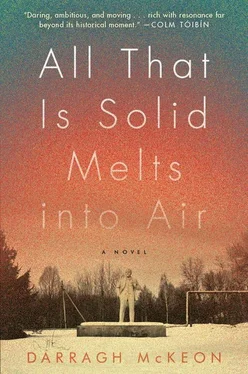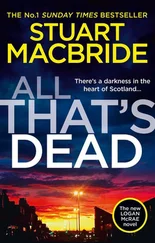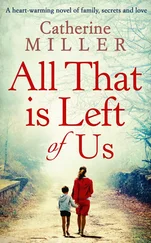He points towards the shed where they keep their chopped wood, which doubles as the boys’ workshop.
“To work on the bike.”
“Bashuk took it. Didn’t your father tell you?”
Bashuk is Iosif’s father.
Artyom wonders if maybe the helicopter has shuffled his brain around. How could Iosif’s father use it? It’s broken. That’s why they’re always working on it. And how could his father not have told him?
Artyom looks at Iosif, not understanding. Iosif hunches his shoulders, displays his palms. Iosif’s mother goes inside while Iosif explains.
“Your father came over yesterday. They both fixed it together. Apparently it was something pretty simple.”
He is almost shouting, even though the noise has passed.
“They were trying not to laugh in front of me. They knew what the problem was all along, they just wanted us to figure it out for ourselves.”
Artyom doesn’t respond for a few moments. He knows that the men don’t regard him as an equal, even if he’s allowed to shoot with them. But it’s a blow to realize that they still see him as a boy, someone to be toyed with.
They walk inside the house. Iosif’s mother stands by their table, her palms spread flat on top of the wood, her shoulders hunched, the muscles in them so tight that it looks as though she is trying to push the legs through the wooden floor. She is breathing heavily. Iosif approaches her but doesn’t know what to do. Sometimes his mother acts in ways he can’t understand. Sometimes she cries while eating dinner but still pretends she’s not crying. Sometimes his father hits her and, instead of hitting back, she does nothing, or says sorry, and Iosif doesn’t know what to think. Iosif hovers his hand over his mother and looks at Artyom, and Artyom encourages him with a tilt of his head and so he places a hand on his mother’s back and she softens, her elbows bend, she speaks breathlessly.
“I have some leftover martsovka. Would you boys like some?”
They sit quietly and she brings the food on two plates and they eat. The sound of their forks tinkling against their plates. No one speaks for a few minutes. The boys don’t ask questions; they wait to hear if Iosif’s mother will offer some information. But, of course, she doesn’t.
“How did they fix it?”
Iosif lifts his head and looks at Artyom.
“The bike. Did they say what was wrong with it?”
“They said it was the distributor. They said they’ll show us when they get back.”
More silence. Iosif’s mother is looking out of the window. The boys don’t feel that they should stand up and leave yet. But it’s difficult to sit still. Artyom straightens the fork on his plate.
“Something bad is happening.”
He says this as a statement, but it’s a question too. A gentle request for Iosif’s mother to reveal a little of what she knows.
“Yes.”
“Is it to do with yesterday morning?”
Iosif’s mother turns sharply in his direction. “What about yesterday morning?”
“Nothing.”
Artyom wants to ask Iosif’s mother why the helicopters are passing. He wants to ask if there’s a military base nearby that no one has told them about. He knows there’s a Komsomol barracks in Mogilev; one of their classmates, Leonid, was invited there to receive a Young Pioneers award. But he knows never to ask about local history or geography. He can ask about far-off places. Any adult will talk to him about a trip to a city, their journey to Moscow or Leningrad many years before. In the school of two rooms that serves his and four other surrounding villages, the teachers hold lessons on lakes and forests, the animals of the tundra, the feeding habits of a heron. He knows that the main industry of Togliatti is the Zhiguli car factory and Volgograd is a major centre of shipbuilding. He knows that during the tenth Five-Year Plan, 4 million square metres of housing were built in Minsk and that it was his fellow Belarusians who invented ice cream (when peasants licked the frozen sap of the birch trees) and potash fertilizer. He knows that one quarter of all Belarusians died in the Great Patriotic War. He has begun to draw conclusions about how his village came into being, but there’s nothing written about it in the four shelves of books that sit behind his teacher’s desk and he knows not to ask.
The people here don’t look the same as each other. Some are darker; others have the same wide faces as the Tartars he sees sometimes in copies of old newspapers. They don’t speak about race or about the generations that preceded them. In this village, they’re a collection of people from nowhere. They came here, one after another, when the war ended, when records were lost or destroyed and there were few facts floating above the ravaged plains for administrators to seize upon. In those few short years you could build a life for yourself that wasn’t defined by fear. In other places they still sent people to the gulags for arriving to work two minutes late, for taking home a pencil in their breast pocket, for not having a particular stamp on a particular document on a particular day. But this didn’t happen in communities the authorities didn’t know existed.
When they came back from battle, the soldiers didn’t return to their families or their loved ones: they knew there was nothing left. In their retreat from the Germans, four years before, they’d burned the villages of their relatives, eviscerating all life in the area, so that when the war turned and they crossed back into these places they were shocked at the extent of their own destruction: all these areas that meant so much to them were recognizable only by a stray sign or the black skeleton of a barn or grain silo. They knew the roads their trucks drove upon were made from the bones of their own people, that the bodies were so thick on the ground that the enemy hurled them together into long rows with great earthmoving machines, the battlefields long since stripped of trees.
These were roads they refused to walk on. They headed for fields, for areas of woodland, discernible in the distance. They simply walked away from their posts, ran away from documentation, from reentry into the system. So when they reached an isolated spot and they stumbled across an iron stove, or the charred remains of a wall, they cut branches and started a fire and sheltered in the shadow of the stones. They burrowed into the ground for warmth while they built the more permanent shelters. Gradually they rebuilt the izbas, first with stone, then wood. They dug wells, drove cows and sheep from markets that were a two-day walk away. Women came and were welcomed and were never asked where they were from. They changed their names and never asked each other about the past. And they loved and bore children, and when uniformed men arrived and insisted the burgeoning farms be formed once again into collectives, the men had their new documentation ready and agreed to what was required of them, but kept some extra land for their own use, a reward for their years of work. And no objections were raised.
They don’t ask about soldiers here. They don’t talk about the military here. Even those men who have just come back from service avoid the subject when they sit together in groups in the long evenings.
Iosif stands from the table and walks outside, and Artyom follows him.
Iosif’s mother asks where they’re going and Iosif tells her that the sheeting on the roof needs to be fixed. He’ll nail it down in case the helicopters pass again and it’s ripped off. In the shelter, Iosif looks in the steel box under the workbench for a hammer and nails. There are only two walls to the shelter, facing north–south, made of thin lengths of wood, with the bark still on them. Logs are piled up against one of the walls, and there’s a small strip of earth where you can stand—the place where the boys kept their motorbike—which is spotted with blotches of oil from all their futile mechanical efforts.
Читать дальше












